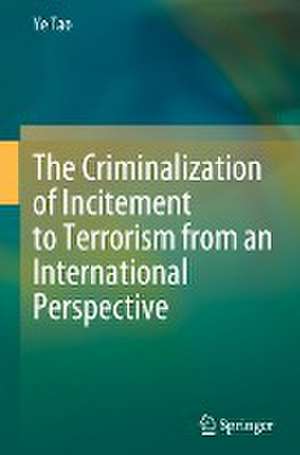The Criminalization of Incitement to Terrorism from an International Perspective
Autor Ye Taoen Limba Engleză Hardback – 26 iul 2023
This book critically analyzes the criminalization of incitement to terrorism under the fundamental principles of legality, necessity, and proportionality with the aim of striking a fair balance between security and liberty on this complicated issue. The criminalization of incitement to terrorism has gained momentum, but no exact or generally accepted definition of this offense exists at the international level. What’s more, given that the criminalization of incitement to terrorism results in restrictions on the exercise of citizens’ freedom of expression, there should be certain limitations on those criminal measures to avoid unnecessary or disproportionate infringement of this fundamental human right. Nevertheless, there has not been a precise standard by which to determine how to draw the line between anti-terrorism and the protection of freedom of expression. Hence, it could be concluded that the criminalization of incitement to terrorism concerns how to balance security and liberty, and the safeguarding principles of legality, necessity, and proportionality should be fully observed in considering this issue.
This book studies definitions of “incitement”, “terrorism”, and “incitement to terrorism” under the relevant international and national legislation, and points out the existing absence, ambiguousness, or substantive divergence in defining actus reus and mens rea regarding incitement to terrorism. It carefully considers the current need for and essential limitations on criminal measures against incitement to terrorism in accordance with the principles of necessity and proportionality, and particularly focuses on how to balance the protection of freedom of expression with the criminalization of incitement to terrorism. In considering how to draw a line between the two, the book formulates precise requirements for objective and subjective elements of this offense in accordance with the principle of legality.
Given its scope, it will be of interest not only to academics, human rights lawyers and practitioners, but also to policymakers, as it offers an extensive evaluation of the effects and counter-effects of existing criminal measures.
Preț: 890.37 lei
Preț vechi: 1085.82 lei
-18% Nou
Puncte Express: 1336
Preț estimativ în valută:
170.39€ • 176.81$ • 142.42£
170.39€ • 176.81$ • 142.42£
Carte tipărită la comandă
Livrare economică 17-31 martie
Preluare comenzi: 021 569.72.76
Specificații
ISBN-13: 9783031343698
ISBN-10: 3031343697
Pagini: 170
Ilustrații: VI, 170 p. 1 illus.
Dimensiuni: 155 x 235 mm
Greutate: 0.43 kg
Ediția:1st ed. 2023
Editura: Springer Nature Switzerland
Colecția Springer
Locul publicării:Cham, Switzerland
ISBN-10: 3031343697
Pagini: 170
Ilustrații: VI, 170 p. 1 illus.
Dimensiuni: 155 x 235 mm
Greutate: 0.43 kg
Ediția:1st ed. 2023
Editura: Springer Nature Switzerland
Colecția Springer
Locul publicării:Cham, Switzerland
Cuprins
Introduction.- Definitional elements of incitement to terrorism from an international perspective.- The necessity and limitations of the criminalization of incitement to terrorism.- The appropriate scope for the criminalization of incitement to terrorism.- Summary, conclusions and recommendations.
Notă biografică
Dr. Ye Tao is a lecturer at the National Security School of China University of Political Science and Law. He obtained his Ph.D. degree in November 2022 from Faculty of Law, University of Freiburg (in cooperation with the Max Planck Institute for the Study of Crime, Security and Law). His research field is in anti-terrorism criminal law.
Textul de pe ultima copertă
This book critically analyzes the criminalization of incitement to terrorism under the fundamental principles of legality, necessity, and proportionality with the aim of striking a fair balance between security and liberty on this complicated issue. The criminalization of incitement to terrorism has gained momentum, but no exact or generally accepted definition of this offense exists at the international level. What’s more, given that the criminalization of incitement to terrorism results in restrictions on the exercise of citizens’ freedom of expression, there should be certain limitations on those criminal measures to avoid unnecessary or disproportionate infringement of this fundamental human right. Nevertheless, there has not been a precise standard by which to determine how to draw the line between anti-terrorism and the protection of freedom of expression. Hence, it could be concluded that the criminalization of incitement to terrorism concerns how to balance security and liberty, and the safeguarding principles of legality, necessity, and proportionality should be fully observed in considering this issue.
This book studies definitions of “incitement”, “terrorism”, and “incitement to terrorism” under the relevant international and national legislation, and points out the existing absence, ambiguousness, or substantive divergence in defining actus reus and mens rea regarding incitement to terrorism. It carefully considers the current need for and essential limitations on criminal measures against incitement to terrorism in accordance with the principles of necessity and proportionality, and particularly focuses on how to balance the protection of freedom of expression with the criminalization of incitement to terrorism. In considering how to draw a line between the two, the book formulates precise requirements for objective and subjective elements of this offense in accordance with the principle of legality.
Given its scope, it will be of interest not only to academics, human rights lawyers and practitioners, but also to policymakers, as it offers an extensive evaluation of the effects and counter-effects of existing criminal measures.
Caracteristici
Outlines the scope of the criminalization of incitement to terrorism considering both security and liberty Comprehensively and critically studies legislation on criminalizing incitement to terrorism worldwide Balances the protection of free expression with the criminalization of incitement to terrorism
